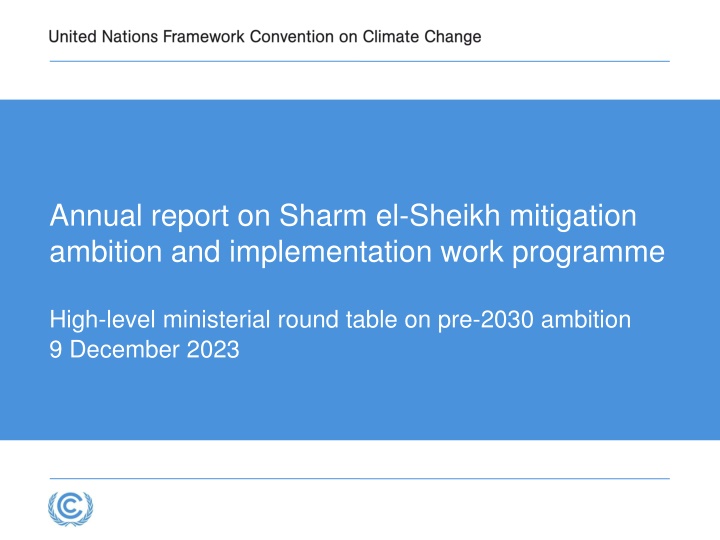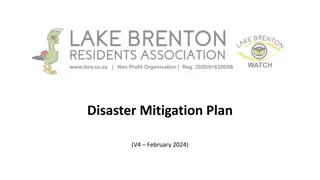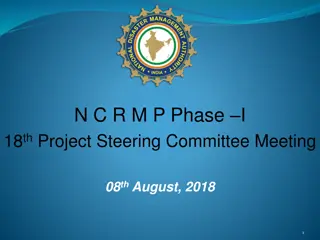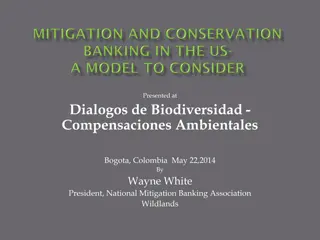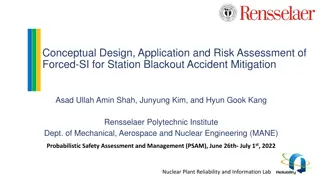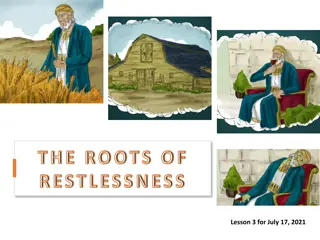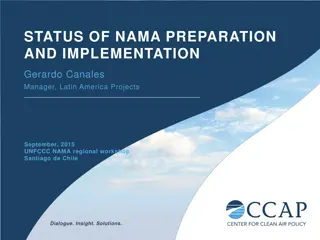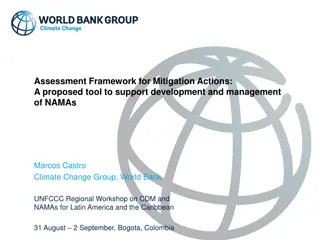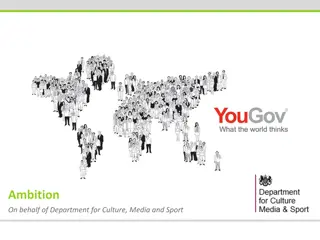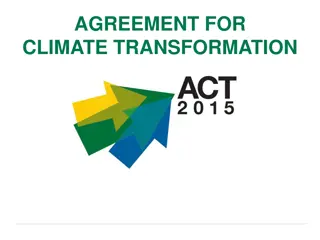Sharm el-Sheikh Annual Report on Mitigation Ambition and Implementation
The annual report on the Sharm el-Sheikh mitigation ambition and implementation work programme highlights the mandate to urgently scale up mitigation efforts in the critical decade ahead. Global dialogues and investment-focused events aim to drive ambition and implementation, focusing on accelerating the energy transition, deploying non-motorized transport modes, and addressing barriers in renewable energy and energy efficiency. Reports from the high-level ministerial round table underscore the significant role of renewable energy and energy efficiency in reducing greenhouse gas emissions. Key barriers include infrastructure limitations and upfront costs, emphasizing the need for international cooperation and financial support.
Download Presentation

Please find below an Image/Link to download the presentation.
The content on the website is provided AS IS for your information and personal use only. It may not be sold, licensed, or shared on other websites without obtaining consent from the author.If you encounter any issues during the download, it is possible that the publisher has removed the file from their server.
You are allowed to download the files provided on this website for personal or commercial use, subject to the condition that they are used lawfully. All files are the property of their respective owners.
The content on the website is provided AS IS for your information and personal use only. It may not be sold, licensed, or shared on other websites without obtaining consent from the author.
E N D
Presentation Transcript
Annual report on Sharm el-Sheikh mitigation ambition and implementation work programme High-level ministerial round table on pre-2030 ambition 9 December 2023
Mandate and Activities Mandate to urgently scale up mitigation ambition and implementationin this critical decade in a manner that complements the global Stocktake Organizing two global dialogues focusing on an exchange of views, information and ideas and investment focused events to bring together a multitude of stakeholders. Other dialogues may be held in conjunction with existing events, such as the regional climate weeks with a view to ensuring inclusive and balanced geographical representation. In 2023 Global Dialogues & Investment-focused events aimed to become an impactful tool to drive ambition and implementation, facilitative and inspiring and bring together the right participants. The topics covered by the Mitigation Work Programme are also considered under the Global Stocktake technical phase (e.g. Synthesis report of the technical assessment paras 112-125). In 2024 and beyond The consideration of outputs may give political signals that the MWP may consider in its work in 2024 and beyond.
Topic in 2023 and Lessons Learned Accelerating just energy transition, including by: Implementing policies and measures with global overview and country-specific experience; Addressing financial, technological and capacity-building needs in this area, such as through international cooperation, including with non-Party stakeholders, and provision of support to developing countries; Promoting sustainable development and understanding socioeconomic effects. Second global dialogue sub-topic First global dialogue sub-topic Deploying and shifting to collective and non-motorized modes of transport Energy and resource efficiency Electrification of vehicles Low and zero-carbon fuels Renewable energy Grid and energy storage Energy efficiency CCU and CCS Participation Doubled Learning-by-doing approach: World Caf format, pitch hub, discussion on structural barriers, technical non-paper on sub-topics of GD Representation of practitioners, private sector More discussions on barriers
Report on the first global dialogue Renewable energy - It was mentioned that: Rapid and large-scale adoption of RE can significantly reduce GHG emissions RE deployment is building on a strong basis, where much progress has been made Can create new industries, jobs and stimulate economic growth Must be country-driven, affordable and ensure energy security Infrastructure, including grid and energy storage capacities, is a major barrier to the rapid deployment of renewable energy Energy efficiency - It was mentioned that: Energy efficiency is a vital building block of the energy transition and climate action Energy efficiency measures need to be implemented across all sectors, in line with national circumstances and priorities Main barriers are the high upfront cost to achiever higher rate of energy efficiency, lack of capacity to implement energy efficiency measures, lack of international cooperation on fostering energy efficiency, and financial challenges
Report on the first global dialogue Grid and energy storage - It was mentioned that: Grid and energy storage play a critical role in enabling the energy transition Technology availability and transfer are key enabling conditions International collaboration and cross-border trade were identified as essential for grid and energy storage Financial needs and infrastructure / connectivity challenges are major barriers Carbon capture and utilization / storage - It was mentioned that: Deployment of CCU and CCS at scale can become a key enabler towards net zero Enhanced international cooperation and support are necessary to address challenges Barriers for these technologies range from high upfront capital costs to the energy intensity of the capturing process
Report on the first global dialogue Policies and measures - It was mentioned that: A wide range of energy and development policies need to be integrated in a holistic and balanced manner to achieve a balance between low-emission targets and other development priorities An inclusive policymaking process can enable broad buy-in and participation in terms of implementing domestic policies and measures Key barriers include the lack of technical capacity and enforcement mechanisms as well as often lengthy processes to develop and roll out new policies Financing issues - It was mentioned that: Public finance is crucial for the just energy transition and is an enabler of private sector investment Challenges in climate finance access, adequacy and architecture need to be addressed, as they are affecting climate ambition and action Barriers to accessing climate finance often include high public debt levels, high financing costs, high capital costs as well as lengthy and demanding processes
Report on the first global dialogue Technology and capacity - It was mentioned that: Availability and deployment of new and emerging technologies are critical to advance the just energy transition Emerging technologies could be areas for international cooperation, incl. grid and storage to integrate a high share of RE, CCUS, and offshore wind Barriers include high initial cost of new and clean energy technologies, the need to update the whole energy system, lack of resources and skills Sustainable development and socioeconomic impacts - It was mentioned that: A holistic approach should be adopted for the just energy transition, balancing climate objectives with national socioeconomic development priorities A just energy transition policy or strategy cannot be a one size fits all solution but should consider the different circumstances and stages of development Barriers often include high upfront cost of implementing projects at national level; lack of energy security and access to energy at community level; policy uncertainty for just energy transition; lack of governmental support
Report on the second global dialogue Deploying and shifting to collective and non-motorized modes of transport - It was mentioned that: Need to adapt local climate, geography, socioeconomic and cultural factors. Integrated transport infrastructure, linked to land-use planning and urban development, is often lacking in developing countries. Alignment between national climate change strategies with local transport policies, and the important role of subnational and local governments in implementing effective policies and measures Energy and resource efficiency - It was mentioned that: Life cycle assessment is needed to avoid shifting problems along cross-border supply chain (e.g. Electric vehicles, biofuels). Global policy coordination is needed to regulate the export of inefficient old vehicles to developing countries. Good practice of vehicle disposal system, extended producer responsibility, compulsory vehicle registration, energy efficiency standards are important policies
Report on the second global dialogue Electrification of vehicles - It was mentioned that: EV uptake in some countries observed, but no one-size-fits-all solutions exist due to different economic realities and disparities in production capacities. Barriers to EV adoption include high costs, inadequate charging infrastructure, lack of clean and stable electricity supply, battery supply chain. Socioeconomic aspects range from better public health and air quality, reskilling need to address job losses, to linkage with energy access. Low and zero-carbon fuels - It was mentioned that: Importance of context-specific solutions based on national circumstances, available infrastructure, capabilities and international cooperation. Raising awareness about new fuels to facilitate adoption together with infrastructure development, market-readiness policy support, life-cycle approach to ensure holistic GHGs accounting for optimal combination of solutions Transition to low- and zero-carbon fuels faces technology and cost challenges, while opportunities around research and development, blending fuels and leveraging existing infrastructure.
Report on the second global dialogue Policies and measures - It was mentioned that: Sustainable transport system needs tailored and holistic approaches, considering multiple policy areas (e.g. urban development, energy, transport) and multi-stakeholder collaboration. Effective institutional arrangements fragmentation. Interdependence between policy implementation and financial resources, access to technology, and technical and policymaking capacity. is needed to overcome policy Financing issues - It was mentioned that: Significant gap between required finance and available funding and investments with several constraints (e.g. high initial cost for infrastructure and facilities, long payback periods, lack of a mechanism to help ensure a suitable level of profit and low return on investment). Public finance is crucial for attracting private investment, particularly regions usually not prioritized by private entities. Need for global investment signal, address debt burden in many developing countries, equity and CBDR-RC
Report on the second global dialogue Technology and capacity - It was mentioned that: The need for commercially viable, affordable and proven technologies, particularly for countries without manufacturing capacity that depend on imported technology. International cooperation crucial for technology access, capacity building and achieve economies of scale for emerging technologies. No one-size-fits-all approach; thus combinations of different modes of transportation, technologies and policy approaches are needed. Sustainable development and socioeconomic impacts - It was mentioned that: Sustainable development is a priority for many developing countries; thus affordability of EVs, low- and zero-carbon fuels, and transport system are important to enable energy transition Crucial to assess socioeconomic impacts for just transitions (e.g. job losses, gender-based approach, deforestation, food security, energy access, poverty reduction). A holistic, nationally driven approach to integrate environment, economic and social considerations through policy coordination.
Investment-focused events First Investment-focused event 5 June 2023 Organized with the support of the Second Investment-focused event 17 October 2023 Hosted by the COP 28 Presidency and organized with the support of the High-level champions, and with organizational support of UNCTAD, took place on 17 October 2023 in conjunction with the World Investment Forum 2023. First Investment-focused event 5 June 2023 Organized with the support of the High-level Champions. High-level Champions. The event spanned three sessions: Session 1: Expert presentations and case studies sharing examples of opportunities best practice and actionable solutions to unlock finance. Session 2: Preparation and development of project proposals and finance structures to overcome barriers of access to finance. Session 3: The third session shared regional perspectives to unlock finance and overcome region specific barriers to access to finance, with a focus on Africa, the Middle East and North Africa, Asia-Pacific, and Latin America The event spanned three sessions: Session 1: Expert presentations and case studies sharing examples of opportunities best practice and actionable solutions to unlock finance. Session 2: Preparation and development of project proposals and finance structures to overcome barriers of access to finance. Session 3: The third session shared regional perspectives to unlock finance and overcome region specific barriers to access to finance, with a focus on Africa, the Middle East and North Africa, Asia-Pacific, and Latin America and the Caribbean. and the Caribbean. The event spanned four sessions: Session1: Accessing finance for mitigation projects, including in the transport sector. Session 2: Pitch Hub session featured project ideas from various countries seeking investment and support for their projects. Session 3: The third session, brought together key finance and investment stakeholders to discuss various structural barriers to mobilizing clean energy investment. Session 4: The fourth session shared regional perspectives to unlock finance and overcome region specific barriers to access to finance in the transport sector, with a focus on Africa, MENA, Asia, SIDS, and eastern and western Europe and other States, Pacific, and Latin America and the Caribbean.
